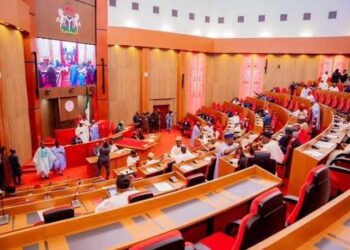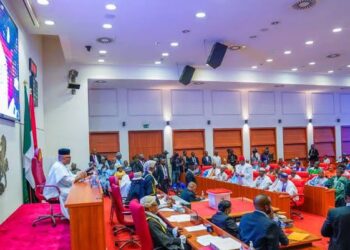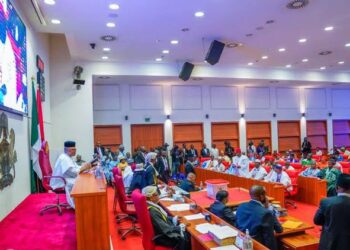In a bid to ensure the accountability and transparency of funds and properties recovered by anti-corruption agencies in Nigeria, the Senate has passed the Proceeds of Crime (Recovery and Management) Bill, 2022.
The year 2022 commenced with various seizures, forfeitures and confiscation of items derived from unlawful activities. While a number of orders for forfeitures were granted, anti-corruption agencies have quite a number of applications before the court seeking orders for forfeitures.
The bill, sponsored by Senator Suleiman Abdu Kwari was passed during plenary on Wednesday after a report by the Joint Committee on Anti-Corruption and Financial Crimes; and Judiciary, Human Rights and Legal Matters was considered.
13 things to know about the bill
- The bill is aimed at creating a platform to aid the fight against corruption, money laundering and illicit movement of stolen funds.
- The bill seeks to expand the mandates of existing statutory institutions to manage proceeds of crime, rather than creating a new body to carry out such functions.
- The bill provides for an effective legal and institutional framework for the recovery and management of the proceeds of crime or benefits derived from unlawful activities.
- It also seeks to improve the ability of law enforcement agencies to seize, freeze, and confiscate stolen assets in Nigeria without contravening human rights laws or any other related laws in the constitution.
- The bill provides for the restraint, seizure, confiscation and forfeiture of property derived from unlawful activities and any instrumentalities used or intended to be used in the commission of such unlawful activities.
- The bill also proposes the creation of the Proceeds of Crime (Recovery and Management) Agency to ensure the enforcement of the provisions of the bill while collaborating with anti-corruption and law enforcement agencies.
- The bill seeks to deprive persons of the proceeds of unlawful activity, instrumentalities of an offence and any other benefit derived from an offence committed within or outside Nigeria.
- It also seeks to prevent the reinvestment of proceeds of unlawful activity in the furtherance of criminal enterprise.
- The bill harmonizes and consolidates existing legislative provisions on the recovery of proceeds of crime.
- It will also strengthen the criminal confiscation procedure by ensuring that the total benefit from a person’s criminal activity is recovered.
- The bill which seeks to sanitise the country’s system of corruption will enhance the operations of the law enforcement agencies that are empowered to seize and manage such assets.
- Final forfeitures granted by the court shall be paid into the Confiscated and Forfeited Account domiciled in the Central Bank of Nigeria.
- Funds recovered will be used for development projects approved by the National Assembly under the annual Appropriation Act and also support the work of the law enforcement and anti-corruption agencies.
A few forfeitures made by EFCC in February 2022
In February, Justice Nkeonye Maha of the Abuja division of the Federal High Court ordered the final forfeiture of 24 properties worth N10. 9 billion belonging to a top military officer held by fronts and proxies to the officer.
Also in February, the EFCC announced that it had secured an interim forfeiture of two landed properties worth over N104 million belonging to one Aminu Sidi Garunbaba, a staff of the Federal Inland Revenue Service (FIRS).
The federal high court ordered the final forfeiture of the sum of N500 million linked to Ahmed Dandija, a former Secretary to the Bauchi State Government (SSG).
Justice Obiora Egwuatu of the Federal High Court, Abuja Division had ordered the interim forfeiture of 10 properties belonging to the former Zamfara State Governor, Abdulaziz Yari.
Justice Emeka Nwite ordered the interim forfeiture of two Abuja properties belonging to Rochas Okorocha, a former governor of Imo State.
















.gif)






